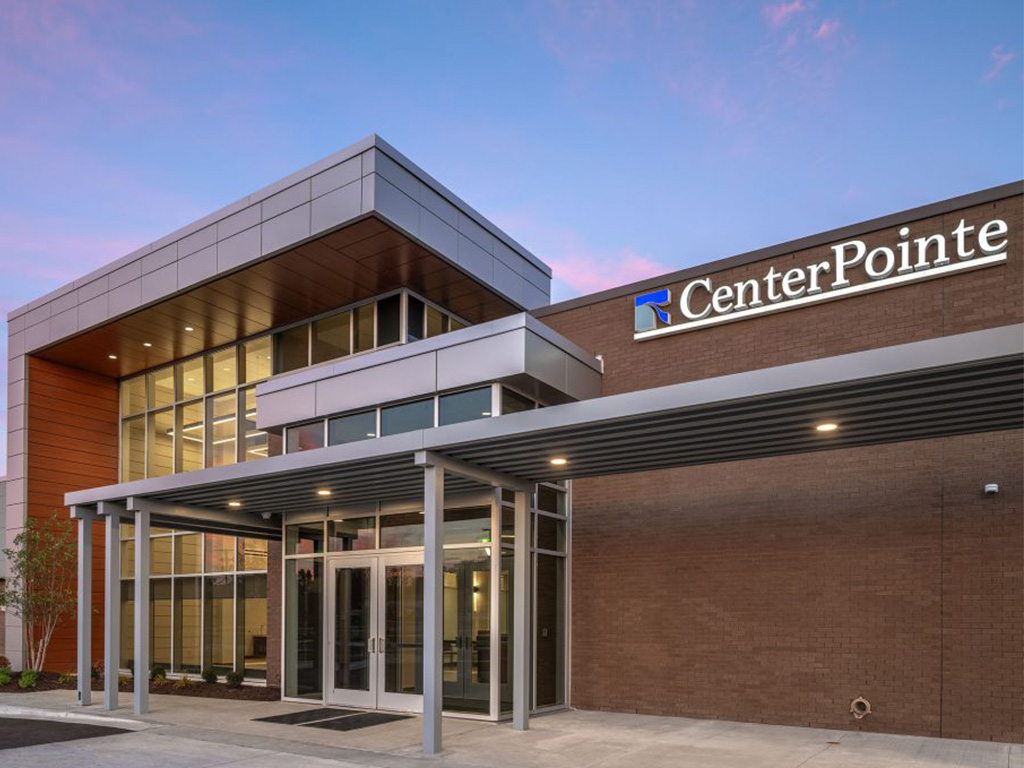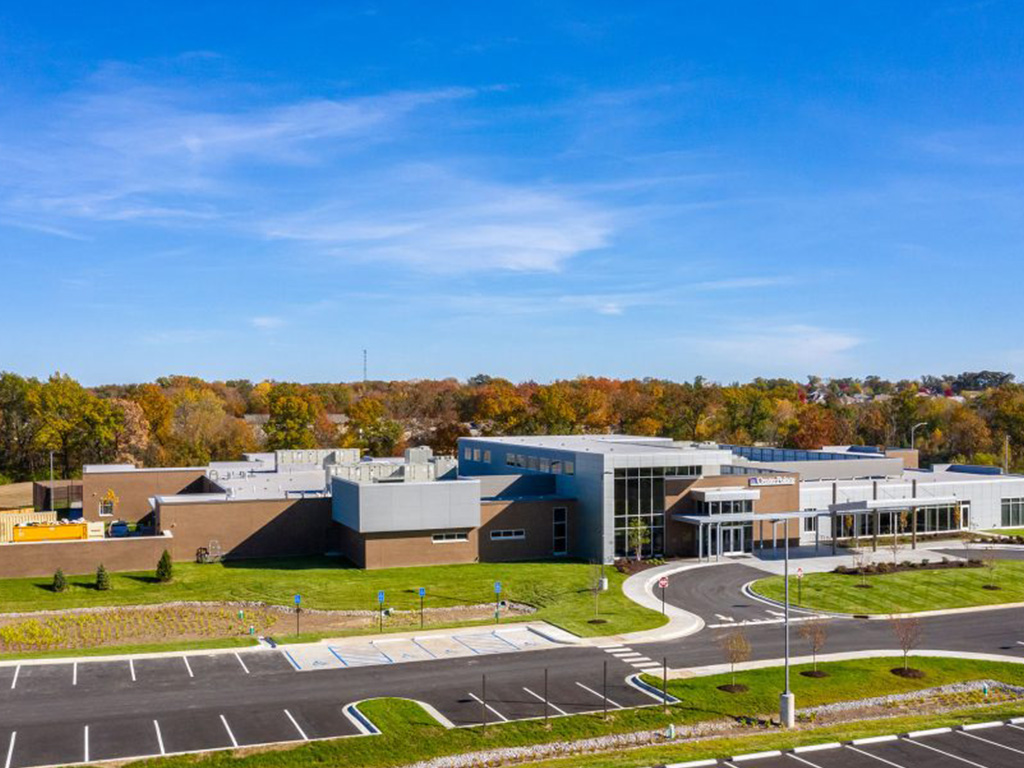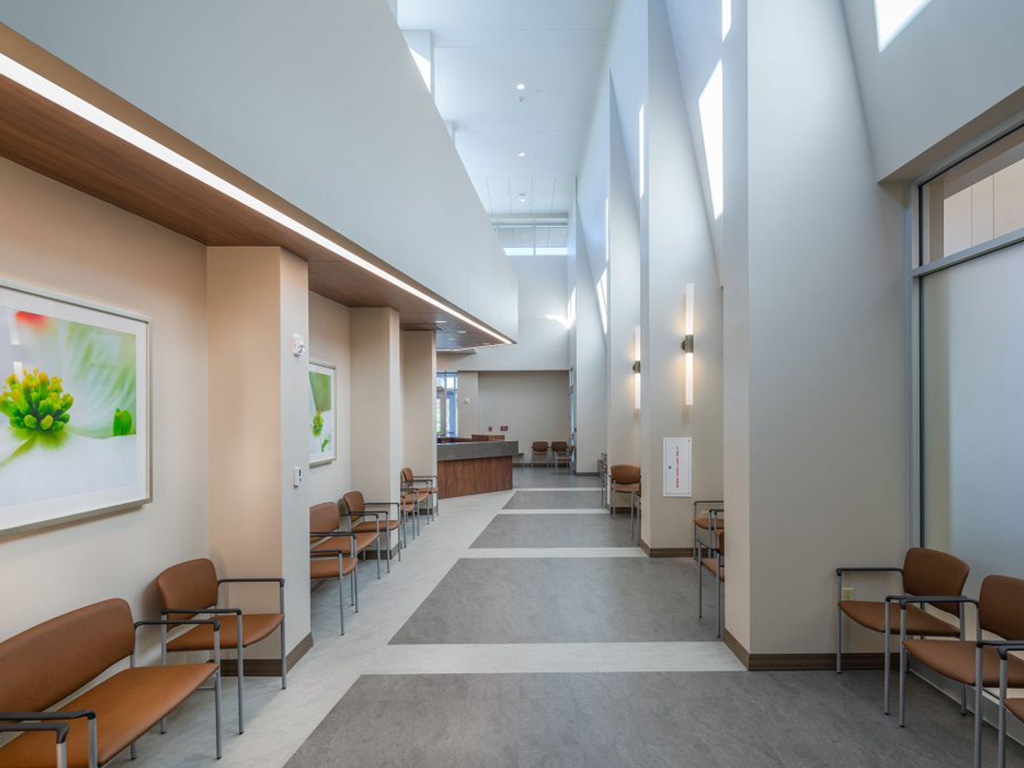Schizoaffective disorder is a rare and often misunderstood mental health concern.
People who develop this disorder exhibit some symptoms that are characteristic of schizophrenia and others that are typically associated with bipolar disorder. The combined impact of these symptoms can cause significant distress and undermine a person’s ability to establish a productive independent lifestyle.
The good news about schizoaffective disorder is that it is treatable. When a person receives the appropriate type and level of treatment for schizoaffective disorder, they can achieve improved health and better overall quality of life.
CenterPointe Hospital of Columbia offers personalized treatment for children, adolescents, adults, and senior adults whose lives have been disrupted by schizoaffective disorder.
Signs & Symptoms of Schizoaffective Disorder
The fifth edition of the Diagnostic and Statistical Manual of Mental Disorders (DSM-5) establishes the following criteria for a diagnosis of schizoaffective disorder:
- The person must have at least two of the following symptoms: delusions, hallucinations, disorganized speech, grossly disorganized or catatonic behavior, and negative symptoms. At least one of these symptoms the person develops must be delusions, hallucinations, or disorganized speech.
- Concurrent with the symptoms described in the previous bullet point, the person must have either a manic episode or a major depressive episode.
- The person must also experience hallucinations or delusions for at least two weeks during a time when they are not in the midst of a manic or major depressive episode.
- The manic or major depressive symptoms will be present most of the time, even when the person is not experiencing the symptoms listed in the first bullet point.
A person who meets these criteria may exhibit the following signs and symptoms of schizoaffective disorder:
- They may have auditory hallucinations, which can include hearing voices or sounds that are not real. They may believe that these sounds are coming from inside their own head or from some external source.
- They may have visual hallucinations, such as seeing people, objects, or light patterns that do not actually exist.
- They might have hallucinations involving the sense of touch (tactile), smell (olfactory), or taste (gustatory), but these are much less common than auditory and visual hallucinations.
- They may develop delusions, which are rigidly held beliefs that are easily disproved or that have no basis in reality. Delusions can include thinking that they are being spied on by the government or that some nefarious force is attempting to kill them. Other examples of delusions include believing that they are the reincarnation of a significant historical figure or that a currently famous person is in love with them.
- If they struggle with disorganized speech, they may have great difficulty communicating with other people. Examples of disorganized speech include randomly jumping from topic to topic with no logical progression, answering questions with unrelated statements, and using invented words that have no meaning to anyone but them.
- If they have grossly disorganized or catatonic behavior, they may dress in a bizarre fashion, hold their body in a strange posture, act in a childlike manner, have sudden outbursts of anger or agitation, and be incapable of completing activities of daily living.
- Someone who has negative symptoms may speak in a flat, monotone voice; rarely use facial expressions; and have no apparent interest in interacting with others.
When a person who has schizoaffective disorder has a manic episode or a major depressive episode, they may display the following signs and symptoms:
- During a manic episode, they may have inflated self-esteem, an excessive amount of energy, and little apparent need for sleep. They may be restless and easily distracted, with racing thoughts and a desire to start multiple projects. They may also act impulsively in potentially dangerous areas, such as gambling, driving, spending, eating, and sex.
- During a depressive episode, they may experience overwhelming sadness, a pervasive sense of worthlessness, persistent fatigue, and low motivation. Their appetite and sleep habits may change drastically, and they may lose interest in topics and activities that were previously very important to them. They may also be plagued by recurring thoughts of death and dying, which can include suicidal ideation.
The signs and symptoms of schizoaffective disorder typically first occur during late adolescence or early adulthood. However, it is possible for children to develop this condition.
Schizoaffective Disorder Statistics
The following statistics about schizoaffective disorder are from a report that was published on the website of the National Library of Medicine:
- The lifetime prevalence of schizoaffective disorder is 0.3%. This means that, on average, 3 out of every 1,000 people are likely to develop schizoaffective disorder.
- Between 10% and 30% of people who receive inpatient treatment for psychosis have schizoaffective disorder.
- Studies suggest that as many as 50% of people who have schizoaffective disorder also develop a co-occurring depressive disorder.
- Experts estimate that about 5% of people who develop schizoaffective disorder will die by suicide.
Schizoaffective Disorder Causes & Risk Factors
There is no single cause of schizoaffective disorder. However, there appears to be a strong genetic or hereditary influence on the development of this disorder.
According to the DSM-5, a person’s risk for schizoaffective disorder can increase if they have a first-degree relative (parent or sibling) who has one of the following mental health concerns:
- Schizoaffective disorder
- Schizophrenia
- Bipolar disorder
Potential Effects of Untreated Schizoaffective Disorder
Schizoaffective disorder can have a negative impact on virtually all parts of a person’s life. Here are just a few examples of the many potential negative effects of untreated schizoaffective disorder:
- Strained relationships with family members and peers
- Inability to form and maintain healthy friendships
- Financial problems due to gambling, spending sprees, or being swindled
- Being harassed, abused, or otherwise victimized
- Medical concerns due to impulsive behaviors or poor self-care
- Being arrested and jailed due to aggressive actions
- Development of co-occurring mental health disorders
- Substance abuse, addiction, overdose, and death
- Being ostracized by peers
- Social isolation
- Self-harm
- Suicide
When a person enters a schizoaffective disorder treatment center, they can decrease their risk for continued harm. While they are in treatment, they can begin to heal from any damage they have already incurred as a result of their struggles with schizoaffective disorder.
Levels of Care for Schizoaffective Disorder Treatment
At CenterPointe Hospital of Columbia, patients may receive treatment for schizoaffective disorder at the following levels:
- Inpatient treatment: We provide inpatient treatment for schizoaffective disorder in age-appropriate units for children, adolescents, adults, and senior adults. At the inpatient level, patients follow structured daily schedules that include multiple therapies and support services. Additional features of inpatient treatment for schizoaffective disorder at our hospital include nutritious meals, comfortable patient rooms, and round-the-clock care.
- Intensive outpatient program (IOP): Adolescents and adults may also receive treatment for schizoaffective disorder at the IOP level. At this level, patients participate in treatment three days per week, with each treatment day including three hours of care. The main method of treatment for schizoaffective disorder in our IOP is group therapy. Patients may also receive medication management services and participate in family therapy sessions on an as-needed basis. Some patients step down to our IOP after completing impatient treatment, but prior enrollment in treatment is not required for admission to our IOP.
- Traditional outpatient services: At the traditional outpatient level, patients who have schizoaffective disorder attend individual sessions with a psychiatrist or a nurse practitioner (NP). We can schedule traditional outpatient sessions at the frequency that best meets each patient’s specific needs. Traditional outpatient treatment can be a valuable source of ongoing support for people who are living with schizoaffective disorder.
Types of Treatment for Schizoaffective Disorder
Depending on their age, needs, and level of care, a patient’s treatment for schizoaffective disorder at our hospital may include the following elements:
- Basic medical services
- Medication management
- Detoxification
- 12-Step education and support
- Family therapy
- Acceptance and commitment therapy (ACT)
- Cognitive behavioral therapy (CBT)
- Dialectical behavior therapy (DBT)
- Motivational interviewing
- Art therapy
- Music therapy
- Psychoeducational groups
- Process groups
- Experiential groups
- Individual therapy
- Transcranial magnetic stimulation (TMS)
Please note that some of the therapies and services listed above are not available at all three levels of care. Also, even if the service is available, we may not incorporate it into every patient’s personalized schizoaffective disorder treatment plan.
To learn more about which therapies and services are available at each level of care, or for additional insights into how we develop each patient’s customized treatment plan, please contact us directly at your convenience.
Benefits of Our Schizoaffective Disorder Treatment Center
The specific types of benefits a person receives at our schizoaffective disorder treatment center will depend on their unique history, needs, and goals. But everyone who receives care at our hospital can benefit from features such as the following:
- Safety: If someone you care about has schizoaffective disorder, you have likely spent a considerable amount of time trying to keep them safe or worrying about their continued well-being. When you choose our schizoaffective disorder treatment center, you can rest assured that the safety of your loved one and our other patients will always be our top priority.
- Compassionate care: We understand the importance of providing quality clinical services for each of our patients. We also appreciate the value of maintaining a respectful and supportive environment. Our treatment professionals will bring a wealth of knowledge and experience to your loved one’s care. They will also ensure that your loved one and all our other patients are treated with compassion and dignity.
- Family support: When a person struggles with schizoaffective disorder, their family members can also be affected. Family therapy sessions are supportive forums where you and your close relatives can process your experiences and receive appropriate guidance from a trained professional. Family therapy sessions can also teach you how to best support your loved one during and after their time in our care.
- Long-term planning: The time that your loved one is in treatment for schizoaffective disorder at our hospital will be a relatively small part of their journey toward improved health. For this reason, we will develop a detailed discharge plan to help connect them with valuable sources of ongoing support. No matter how long your loved one is in our care, we will be focused on providing them with the personalized services that can yield long-term benefits.
This content was written on behalf of and reviewed by the clinical staff at CenterPointe Hospital of Columbia.
Schizoaffective disorder is a mental health condition that involves manic or major depressive episodes along with symptoms of psychosis, such as delusions and hallucinations. Schizoaffective disorder can affect the way a person thinks, acts, and feels, which can be scary and overwhelming for those who struggle with it.
At Signature Psychiatric Hospital, located in North Kansas City and Liberty, Missouri, we provide personalized inpatient treatment for adults who are suffering from schizoaffective disorder, along with outpatient care for adolescents ages 13-17.
By receiving care at our premier inpatient treatment center, people who have schizoaffective disorder can stabilize, address crisis symptoms, and work toward long-term healing in a supportive treatment environment.
Signs & Symptoms of Schizoaffective Disorder
Schizoaffective disorder symptoms can vary depending on the mood episodes (manic or depressive) and psychosis symptoms someone may be experiencing. In general, schizoaffective disorder includes persistent mood-related symptoms as well as delusions or hallucinations that last for at least two weeks without a major mood episode.
Signs and symptoms of schizoaffective disorder may include:
- Delusions (fixed false beliefs)
- Hallucinations (false perceptions of reality)
- Disorganized speech
- Lack of expression
- Strong feelings of sadness and hopelessness
- Lack of energy
- Feeling excited, energized, or irritable
- Racing thoughts
- Distractibility
- Excessive talking
- Increase in reckless behavior
If you are experiencing schizoaffective disorder symptoms, it may be important to seek support at a professional treatment place such as Signature Psychiatric Hospital. At Signature, our qualified staff is ready to provide you with an assessment that can evaluate your behavioral healthcare needs and determine whether Signature is the right place for you.
Schizoaffective Disorder Statistics
According to the National Alliance on Mental Illness (NAMI), schizoaffective disorder has an estimated lifetime prevalence of 0.3%, making it less common than other mental health conditions.
The Diagnostic and Statistical Manual of Mental Disorders, Fifth Edition (DSM-5) reports that schizoaffective disorder symptoms typically begin in early adulthood. However, onset can occur anytime from adolescence through to older adulthood.
Additionally, according to information shared by the National Library of Medicine (NLM), approximately 10%-30% of inpatient admissions related to psychosis are for schizoaffective disorder.
Potential Effects of Schizoaffective Disorder
If left untreated, schizoaffective disorder can have a range of negative impacts on someone’s health, well-being, and overall functioning.
Effects of schizoaffective disorder can include:
- Problems at work or school
- Social difficulties
- Family conflict
- Isolation
- Feelings of loneliness
- Trouble functioning in daily life
- Lack of self-care
- Loss of quality of life
- Onset of co-occurring mental health concerns or addictions
- Increased risk for suicide
Fortunately, it is possible to manage the symptoms of schizoaffective disorder and work toward a healthier future. Seeking care from a qualified schizoaffective disorder treatment center can help you heal from the challenges you may have faced and acquire resources and strategies that can help you live a more satisfying life.
Benefits of Schizoaffective Disorder Treatment
Often, one of the first steps in treating schizoaffective disorder is a comprehensive evaluation and accurate diagnosis. Receiving an assessment at a qualified treatment place such as CenterPoint Columbia can help you access appropriate treatment and begin the process of healing and managing the symptoms you have been suffering from.
CenterPoint Columbia offers schizoaffective disorder treatment that is designed based on the unique needs and strengths of each patient.
At CenterPoint Columbia’s inpatient schizoaffective disorder treatment center, you can work with a professional treatment team that will create a customized care plan just for you. Your individualized treatment plan will outline therapies and services that can help you manage crisis symptoms and prepare for the next steps on your treatment journey.
Receiving personalized schizoaffective disorder treatment can help you build coping skills and identify support systems that can assist you on the path to long-term healing.
Therapies Used in Schizoaffective Disorder Treatment
Schizoaffective disorder treatment often includes the following features:
- Education about schizoaffective disorder
- Skill-building and problem-solving, including in the areas of communication, relationships, and coping strategies
- Meaningful support, including through family and group therapies
At our inpatient schizoaffective disorder treatment center, we offer family, and group therapies for patients. These counseling sessions can provide valuable opportunities for learning and support alongside qualified professionals. We also offer medication management for patients who may require this service as part of their treatment plans, as well as specialized support for people who are struggling with co-occurring addictions.
Your care at Signature may also draw on cognitive behavioral therapy (CBT), which can help you explore thoughts and behaviors and develop new ways of responding to challenges and stressors.
Throughout treatment, social support can be a key resource as you work to manage your symptoms and improve your well-being. Supportive family members and friends can help you follow your treatment protocols and maintain structure and wellness in your daily life.
Why Choose Our Schizoaffective Disorder Treatment Center
At CenterPoint Columbia, we offer inpatient schizoaffective disorder treatment in Columbia, Missouri.
We have a dedicated multidisciplinary staff that works to provide supports and services that can help patients positively transform their lives. At CenterPoint Columbia, you may work with doctors, nurses, social workers, and more as you follow your individualized treatment plan.
CenterPoint Columbia also provides a full continuum of care and detailed aftercare planning so that patients can receive the follow-up services they may need on their ongoing healing journeys.
This content was written on behalf of and reviewed by the clinical staff at CenterPoint Hospital of Columbia.














